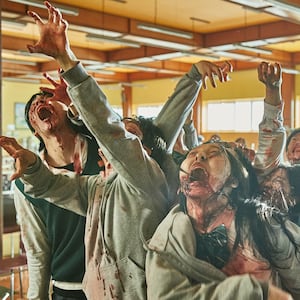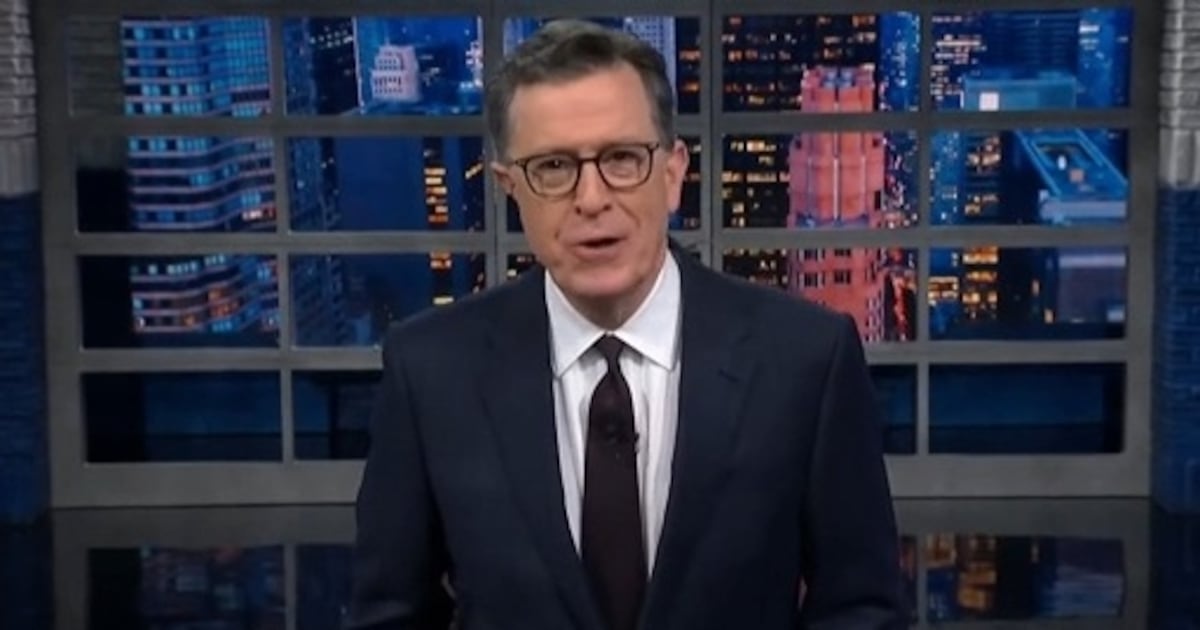Motherhood is at the core of Raised by Wolves, which is fitting given that Aaron Guzikowski’s sci-fi saga is executive-produced by Ridley Scott, whose Alien and Prometheus serve as its clear spiritual ancestors. The story of two androids tasked with nurturing human children on the distant planet of Kepler-22b in the aftermath of a 22nd-century war on Earth between rival Atheist and faith-based Mithraic clans, the HBO Max series posits maternity as the source of both creation and destruction. Those twin forces are wielded by Mother, a Mithraic war android known as a necromancer that’s been retrofitted to function as an Atheist caregiver for her human “offspring,” and which—as brilliantly embodied by Danish actress Amanda Collin—joins the ranks of Ian Holm’s Ash and Michael Fassbender’s David as another futuristic Scott synthetic torn between the dictates of programming and the allure of human emotions.
At the conclusion of Raised by Wolves’ maiden 2020 run, Mother and her service-robot partner Father (Abubakar Salim) had departed the barren wasteland colony they’d established with remaining child Campion (Winta McGrath) for the Tropical Zone on the far side of Kepler-22b. The reason for their trip was the intended destruction of Mother’s own baby, a flying bio-mechanical serpent that was conceived through Mother’s virtual-simulation coitus with her creator, and which turned out to be a rapidly growing monster that fed on human blood. Alas, their assassination attempt—via plunging into the core of the planet—didn’t work out as planned, and at the beginning of season two, they’re discovered by a collection of surviving Atheists who’ve founded a thriving colony in this region, which is far more verdant and fruitful than the rocky desert Mother and Father previously inhabited.
This outpost is governed by an advanced quantum computer known as The Trust that looks like a brain-spinal column hybrid living in a cylindrical chamber, and which dispenses orders to its Atheist counterparts through a disembodied voice and via its loyal human minion Cleaver (Peter Christoffersen). Mother and Father are quickly reunited in this encampment with Campion and the rest of the Mithraic children that Mother rescued and took under her wing, including Paul (Felix Jamieson), a true believer intent on converting Campion into a zealous follower of the sun god Sol. If Paul staunchly clings to his faith, though, he’s still alienated from Sue (Niamh Algar), an Atheist who took Paul’s mother’s face and identity in order to escape Earth. And he’s even more furious at his imposter-father Marcus (Travis Fimmel), who now roams the wilds of Kepler-22b as a crazed Sol convert who’s convinced that the deity speaks to him—and thus that he’s destined to bring about a new kingdom of heaven. The increasingly dark veins that course through Marcus’ face, however, suggest he's fallen victim to something more sinister.
Marcus, Campion and Paul all think they might be the chosen one (i.e. an orphan in a barren land) foretold by Mithraic prophesy, and Raised by Wolves further stokes those suspicions through their discovery of a “tree of life” that might confirm their divine status. Religious elements are everywhere in Guzikowski’s tale, with Father attempting to resurrect an ancient android back to life via his own fuel blood (thereby making him a creator, like Mother), Mother’s enormous infant serpent lurking in the Tropical Zone’s misty mountaintops, and both Mother and Marcus hearing an enigmatic voice—the word of Sol or another, nefarious sentience?—that has the potential to corrupt. The secular and the spiritual are in constant literal and figurative battle with each other, and Guzikowski complicates that dynamic in intriguing ways, so that these lost souls’ worldviews become less sturdy than they initially assumed.
Everyone is beholden to some sort of higher power—and yet also driven by individualistic impulses—in Raised by Wolves’ second season, which initially focuses on Mother and company’s attempts to integrate themselves into their new clan (who don’t take kindly to Mithraic interlopers), and also to repair their fraying bonds with each other. For Mother, that entails hunting her serpent progeny, who’s naturally viewed as a threat by The Trust and its acolytes. Father’s own relationship to Mother is also less than wholly secure, due to the former’s jealousy over being left out of the latter’s solitary procreation. The same goes for Campion and Paul, who eventually develop a friendship with Vrille (Morgan Santo), an android programmed to mimic the dead daughter of Decima (Kim Engelbrecht), a Mithraic prisoner who becomes the devout girlfriend of Marcus, and therefore the first member of his budding congregation.
There’s no show without an ongoing conflict between Mother and Marcus, mirror-image adversaries with a mutual habit of affecting a Jesus Christ pose, and Raised by Wolves slowly puts them back on a collision course, albeit without sacrificing any of its more introspective, melancholic character work. Collin is vital to that dark mood. With closely cropped hair, a borderline-asexual frame encased in a latex suit, and dark, vacant eyes that are all the more haunting when she emotes, the actress has made Mother a beguiling three-dimensional protagonist trapped between violent preordained decrees and dawning desires as a protector and nurturer. She’s at once the coldest and warmest presence in a drama that thrives on desolation, epitomized by the proceedings’ black, blue and gray color palette, and the inhospitable ruggedness of its alien setting.
At least in the first three installments of Raised by Wolves’ return engagement, the show continues to cast an eerie spell reminiscent of Scott’s sci-fi films, amplified by its shared fondness for sleek, silver, spherical architectural designs, dank passageways and caverns, milky-white robot blood, and physical, psychological and emotional unions between organic and inorganic beings. Like Prometheus, it’s a novel (re)creation myth of a civilization born from disparate—and yet also similar—species that have been forced to contend with one another if they hope to survive. Which isn’t to say that it lacks a unique identity; with a confidence that seems to grow with each episode, Guzikowski’s series proves a formidable descendant of its great predecessors, imbued with their finest qualities as well as its own distinctive virtues.







